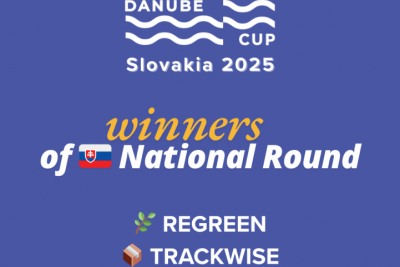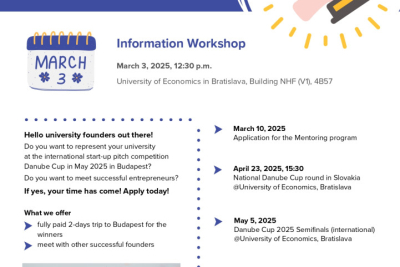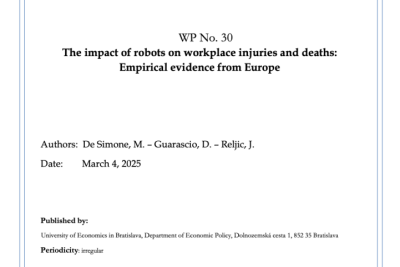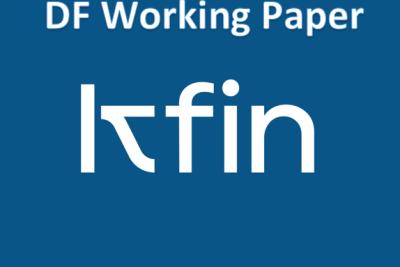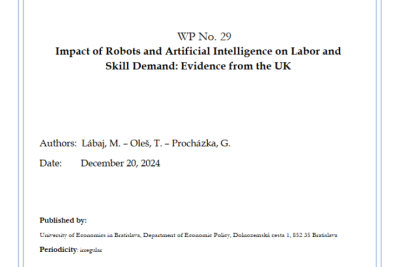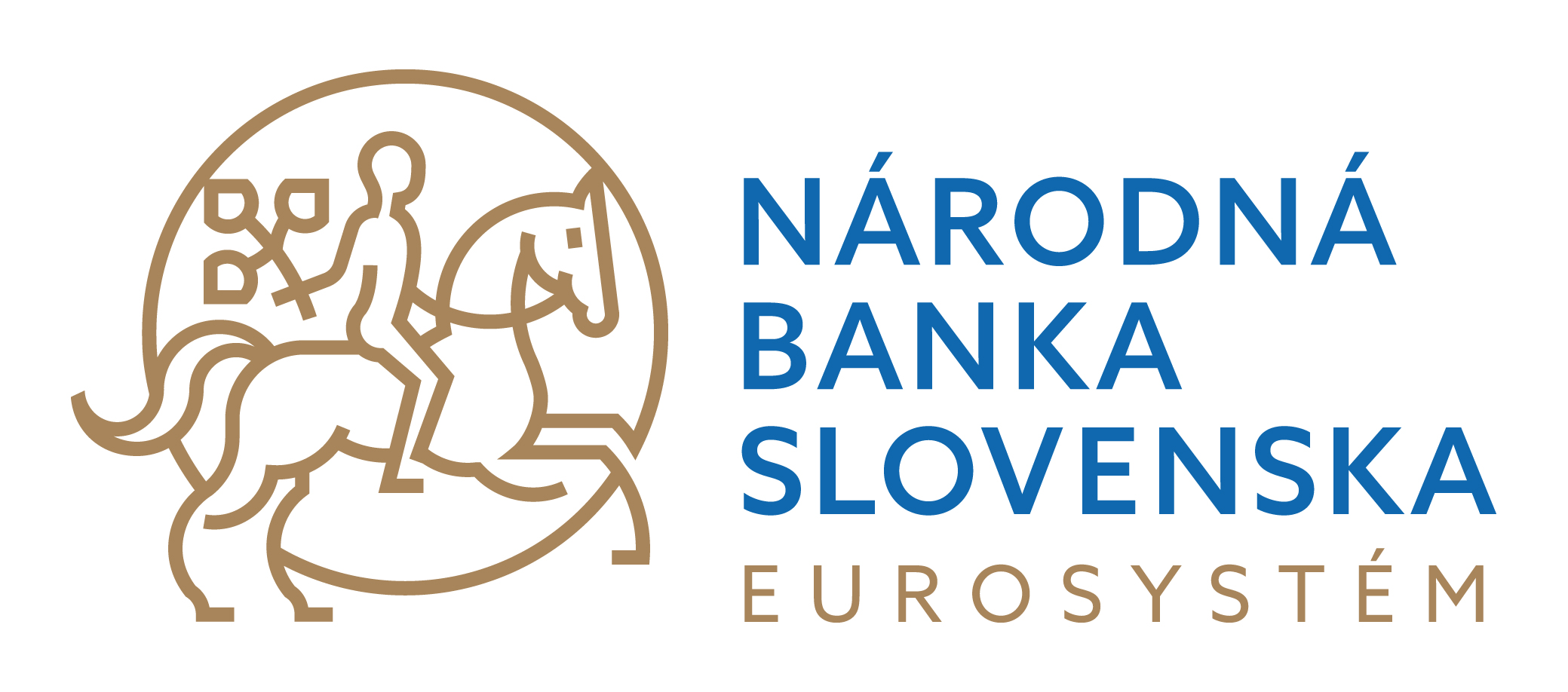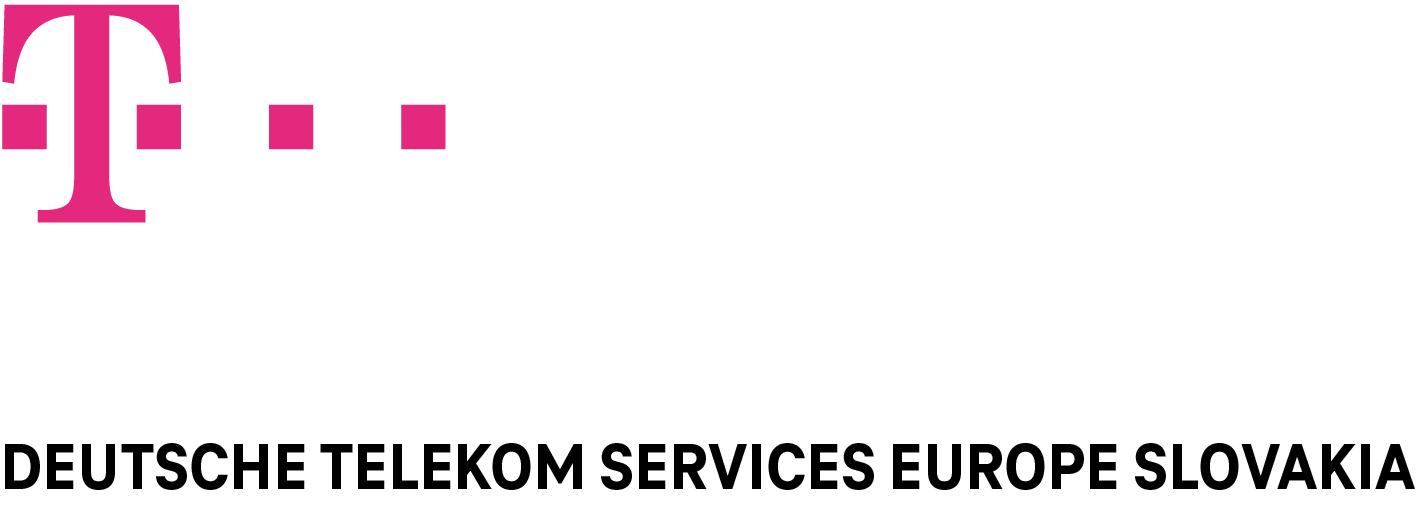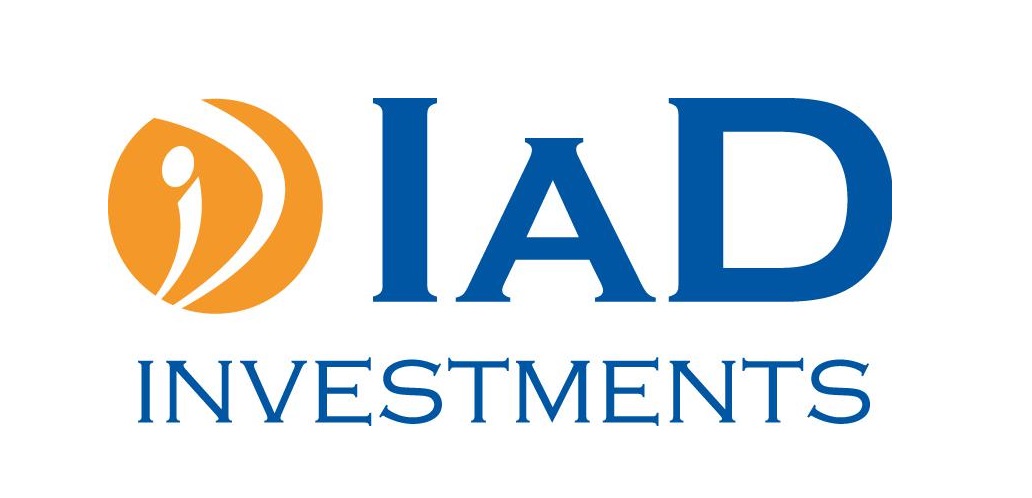Poznáme víťazov národného kola International Pitch Competition Slovakia – DANUBE CUP!
Dňa 23. apríla 2025 sa na Ekonomickej univerzite v Bratislave, na pôde Katedry sociálneho rozvoja a práce a Katedry financií NHF, konalo národné kolo súťaže International Pitch Competition Slovakia v rámci DANUBE CUP.
Do online semifinále, ktoré sa uskutoční 5. mája 2025, postúpili dva študentské tímy:
REGREEN, TRACKWISE
Obom tímom srdečne gratulujeme a prajeme veľa úspechov v ďalšom kole!
Danube Cup 2025: International competition for student startups
Since its inception in 2016 as a student pitch competition between two Hungarian universities, the Danube Cup has grown into an esteemed international network of 11 universities from Austria, Germany, Hungary, Serbia, and Slovakia. The competition fosters entrepreneurship among university students, providing them with an opportunity to showcase their innovative ideas on an international stage.
We are proud to announce that the University of Economics in Bratislava, Faculty of Economics and Finance is now part of this prestigious network through its Department of Social Development and Labour and the Department of Finance.
Why Join Danube Cup?
- Gain access to an international community of entrepreneurial students, educators, and researchers.
- Network with successful entrepreneurs and university startup teams.
- Compete for a fully paid two-day trip to Budapest for the final round!
Application form here: Registration for the national preselection of the Danube Cup Pitching Competition 2025.
Key Dates:
📅 March 3, 2025 – Information Workshop at the University of Economics in Bratislava
📅 March 10, 2025 – Deadline for Mentoring Program Applications
📅 April 23, 2025 – National Round in Slovakia
📅 May 5, 2025 – International Semifinals in Bratislava
📅 May 23, 2025 – Danube Cup Final at Corvinus University in Budapest
Are you ready to represent your university at Danube Cup 2025? Join us at the Information Workshop to gain more information!
🌐 More information
*******
Danube Cup 2025: Medzinárodná súťaž pre študentské startupy
Od svojho vzniku v roku 2016 ako študentská súťaž v podnikaní medzi dvoma maďarskými univerzitami sa Danube Cup rozrástol na uznávanú medzinárodnú sieť 11 univerzít z Rakúska, Nemecka, Maďarska, Srbska a Slovenska. Súťaž podporuje podnikanie medzi vysokoškolskými študentmi a poskytuje im príležitosť prezentovať svoje inovatívne nápady na medzinárodnej scéne.
S hrdosťou oznamujeme, že Ekonomická univerzita v Bratislave, Národohospodárska fakulta je teraz súčasťou tejto prestížnej siete prostredníctvom Katedry sociálneho rozvoja a práce a Katedry financií.
Prečo sa pripojiť k Danube Cup?
- Získate prístup k medzinárodnej komunite študentov, pedagógov a výskumníkov v oblasti podnikania.
- Nadviažete kontakty s úspešnými podnikateľmi a univerzitnými startupovými tímami.
- Súťažíte o plne hradený dvojdňový výlet do Budapešti na finálové kolo!
Prihlásiť sa môžete tu: Registration for the national preselection of the Danube Cup Pitching Competition 2025.
Kľúčové dátumy:
📅 3. marca 2025 - Informačný seminár na Ekonomickej univerzite v Bratislave
📅 10. marca 2025 - uzávierka prihlášok do Mentorského programu
📅 23. apríla 2025 - Národné kolo na Slovensku
📅 5. mája 2025 - Medzinárodné semifinále v Bratislave
📅 23. mája 2025 - Finále Danube Cup na Univerzite Corvinus v Budapešti
Ste pripravení reprezentovať svoju univerzitu na Danube Cup 2025? Pridajte sa k nám na informačnom seminári a získajte viac informácií!
🌐 Viac informácií
Abstract
This paper examines the impact of robotisation on workplace safety in EU manufacturing sectors between 2011 and 2019. To address endogeneity concerns, we employ an instrumental variable approach and find that robot adoption reduces both injuries and fatalities. Specifically, a 10% increase in robot adoption is associated with a 0.066% reduction in fatalities and a 1.96% decrease in injuries. Our findings highlight the context-dependent nature of these effects. The safety benefits of robotisation materialise only in high-tech sectors and in countries where industrial relations provide strong worker protections. In contrast, in traditional industries and countries with weaker institutional frameworks, these benefits remain largely unrealised. The results are robust to several sensitivity tests.
df_wp_inovácie_v_sektore_zdravotníctva.pdf
Lucia Lednárová Dítětová
DF WORKING PAPER NO: 12/2024
ISSUED IN December 2024
df_wp__ekonomické_vplyvy_inovácií_v_zdravotníctve.pdf
Gejza Mihály
DF WORKING PAPER NO: 12/2024
ISSUED IN December 2024
Jakub Zeman
DF WORKING PAPER NO: 12/2024
ISSUED IN December 2024
Abstract
Over the past four decades, automation technologies have replaced routine tasks performed by medium-skilled workers, and contributed to increased labor market polarization. With the advent of artificial intelligence, this dynamic may have shifted, extending task substitution to non-routine tasks performed by high-skilled workers. Using textual analysis and descriptions of technology found in patent texts, we construct novel occupational exposures to robot and artificial intelligence technologies. These occupational exposures are then used to analyze changes in labor and skill demand over the last decade in the United Kingdom. We find that the middle part of the income distribution is primarily exposed to robot technology, while exposure to artificial intelligence increases monotonically across income percentiles. Second, we find that exposure to robots is strongest among high school dropouts and declines monotonically with education, while artificial intelligence automation has a limited impact on the same workers, with a pronounced exposure among college graduates. Third, our findings suggest asymmetric effects of automation technologies across skill groups. Robot automation reduces demand for low-skilled workers, while AI technology shifts demand away from high-skilled workers, with the direct effects consistently negative despite the presence of several compensating mechanisms. Finally, a joint estimation of the effects of robot and AI automation shows that robot automation is positively associated with an increase in demand for skilled workers, while AI automation is weakly associated with a decrease in demand for skilled workers. These patterns indicate structural changes in the labor market, with important implications for wage inequality and the future of work.
Strategický partner
Hlavní partneri
Partneri

